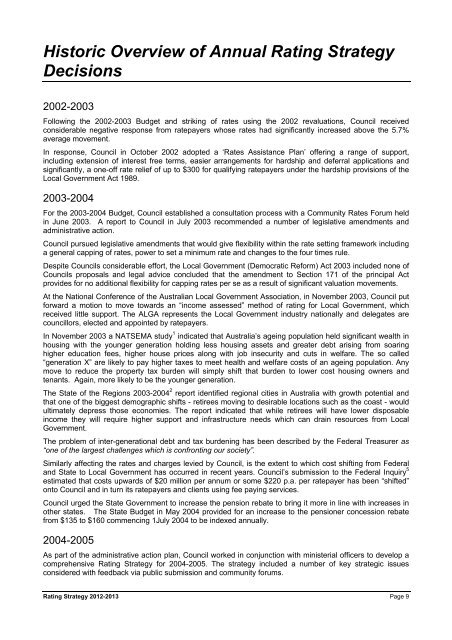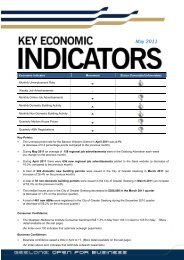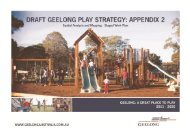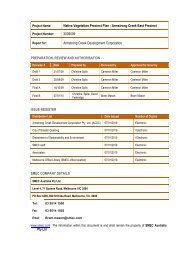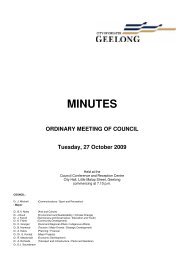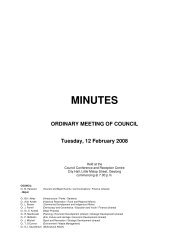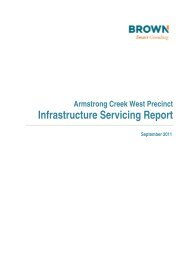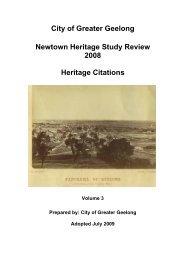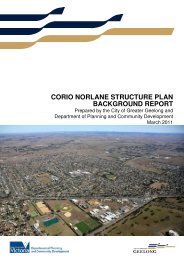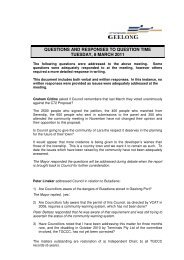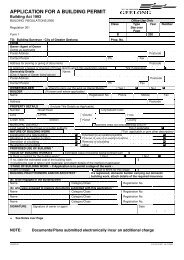CITY OF GREATER GEELONG 2012-2013 Rating StRategy
CITY OF GREATER GEELONG 2012-2013 Rating StRategy
CITY OF GREATER GEELONG 2012-2013 Rating StRategy
You also want an ePaper? Increase the reach of your titles
YUMPU automatically turns print PDFs into web optimized ePapers that Google loves.
Historic Overview of Annual <strong>Rating</strong> Strategy<br />
Decisions<br />
2002-2003<br />
Following the 2002-2003 Budget and striking of rates using the 2002 revaluations, Council received<br />
considerable negative response from ratepayers whose rates had significantly increased above the 5.7%<br />
average movement.<br />
In response, Council in October 2002 adopted a ‘Rates Assistance Plan’ offering a range of support,<br />
including extension of interest free terms, easier arrangements for hardship and deferral applications and<br />
significantly, a one-off rate relief of up to $300 for qualifying ratepayers under the hardship provisions of the<br />
Local Government Act 1989.<br />
2003-2004<br />
For the 2003-2004 Budget, Council established a consultation process with a Community Rates Forum held<br />
in June 2003. A report to Council in July 2003 recommended a number of legislative amendments and<br />
administrative action.<br />
Council pursued legislative amendments that would give flexibility within the rate setting framework including<br />
a general capping of rates, power to set a minimum rate and changes to the four times rule.<br />
Despite Councils considerable effort, the Local Government (Democratic Reform) Act 2003 included none of<br />
Councils proposals and legal advice concluded that the amendment to Section 171 of the principal Act<br />
provides for no additional flexibility for capping rates per se as a result of significant valuation movements.<br />
At the National Conference of the Australian Local Government Association, in November 2003, Council put<br />
forward a motion to move towards an “income assessed” method of rating for Local Government, which<br />
received little support. The ALGA represents the Local Government industry nationally and delegates are<br />
councillors, elected and appointed by ratepayers.<br />
In November 2003 a NATSEMA study 1 indicated that Australia’s ageing population held significant wealth in<br />
housing with the younger generation holding less housing assets and greater debt arising from soaring<br />
higher education fees, higher house prices along with job insecurity and cuts in welfare. The so called<br />
“generation X” are likely to pay higher taxes to meet health and welfare costs of an ageing population. Any<br />
move to reduce the property tax burden will simply shift that burden to lower cost housing owners and<br />
tenants. Again, more likely to be the younger generation.<br />
The State of the Regions 2003-2004 2 report identified regional cities in Australia with growth potential and<br />
that one of the biggest demographic shifts - retirees moving to desirable locations such as the coast - would<br />
ultimately depress those economies. The report indicated that while retirees will have lower disposable<br />
income they will require higher support and infrastructure needs which can drain resources from Local<br />
Government.<br />
The problem of inter-generational debt and tax burdening has been described by the Federal Treasurer as<br />
“one of the largest challenges which is confronting our society”.<br />
Similarly affecting the rates and charges levied by Council, is the extent to which cost shifting from Federal<br />
and State to Local Government has occurred in recent years. Council’s submission to the Federal Inquiry 5<br />
estimated that costs upwards of $20 million per annum or some $220 p.a. per ratepayer has been “shifted”<br />
onto Council and in turn its ratepayers and clients using fee paying services.<br />
Council urged the State Government to increase the pension rebate to bring it more in line with increases in<br />
other states. The State Budget in May 2004 provided for an increase to the pensioner concession rebate<br />
from $135 to $160 commencing 1July 2004 to be indexed annually.<br />
2004-2005<br />
As part of the administrative action plan, Council worked in conjunction with ministerial officers to develop a<br />
comprehensive <strong>Rating</strong> Strategy for 2004-2005. The strategy included a number of key strategic issues<br />
considered with feedback via public submission and community forums.<br />
<strong>Rating</strong> Strategy <strong>2012</strong>-<strong>2013</strong> Page 9


